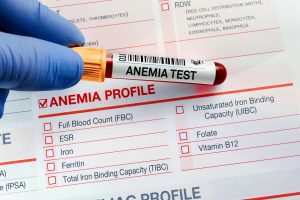 Anemia is the most common blood condition in the United States and affects over two billion people globally. More women suffer from iron deficiency anemia than men. Anemia reduces the number of healthy red blood cells available to carry oxygen throughout your body, leaving you feeling tired and weak.
Anemia is the most common blood condition in the United States and affects over two billion people globally. More women suffer from iron deficiency anemia than men. Anemia reduces the number of healthy red blood cells available to carry oxygen throughout your body, leaving you feeling tired and weak.
The symptoms of anemia can range from mild and temporary to chronic and severe, potentially causing life-threatening complications such as heart failure. Severe symptoms may be more likely for people over the age of 65.
The severity of anemia mainly depends on its cause, which can include factors such as:
- Deficiency of iron, folate, or vitamin B-12
- Acute or chronic inflammatory diseases
- Radiation and chemotherapy
- Infections and autoimmune diseases
- Exposure to toxic chemicals
- Bone marrow disease
- Blood disease
- Genetics
Not all forms of anemia are preventable, particularly if it’s inherited genetically or the result of a condition with unclear causes. Increasing your intake of foods rich in iron, folate, and vitamins B-12 and C can help prevent certain forms of anemia or manage anemic symptoms.
Additionally, you may be able to prevent anemia associated with other conditions by managing the risk factors of those conditions. This may include reducing your intake of alcohol or avoiding exposure to toxic substances as much as possible.
A hematologist can provide treatment to help relieve anemia symptoms through intravenous infusions, red blood cell transfusions, bone marrow transplants, erythropoietin injections, or surgery to stop internal bleeding that may cause the condition.
All content of this newsletter is intended for general information purposes only and is not intended or implied to be a substitute for professional medical advice, diagnosis or treatment. Please consult a medical professional before adopting any of the suggestions on this page. You must never disregard professional medical advice or delay seeking medical treatment based upon any content of this newsletter. PROMPTLY CONSULT YOUR PHYSICIAN OR CALL 911 IF YOU BELIEVE YOU HAVE A MEDICAL EMERGENCY.
